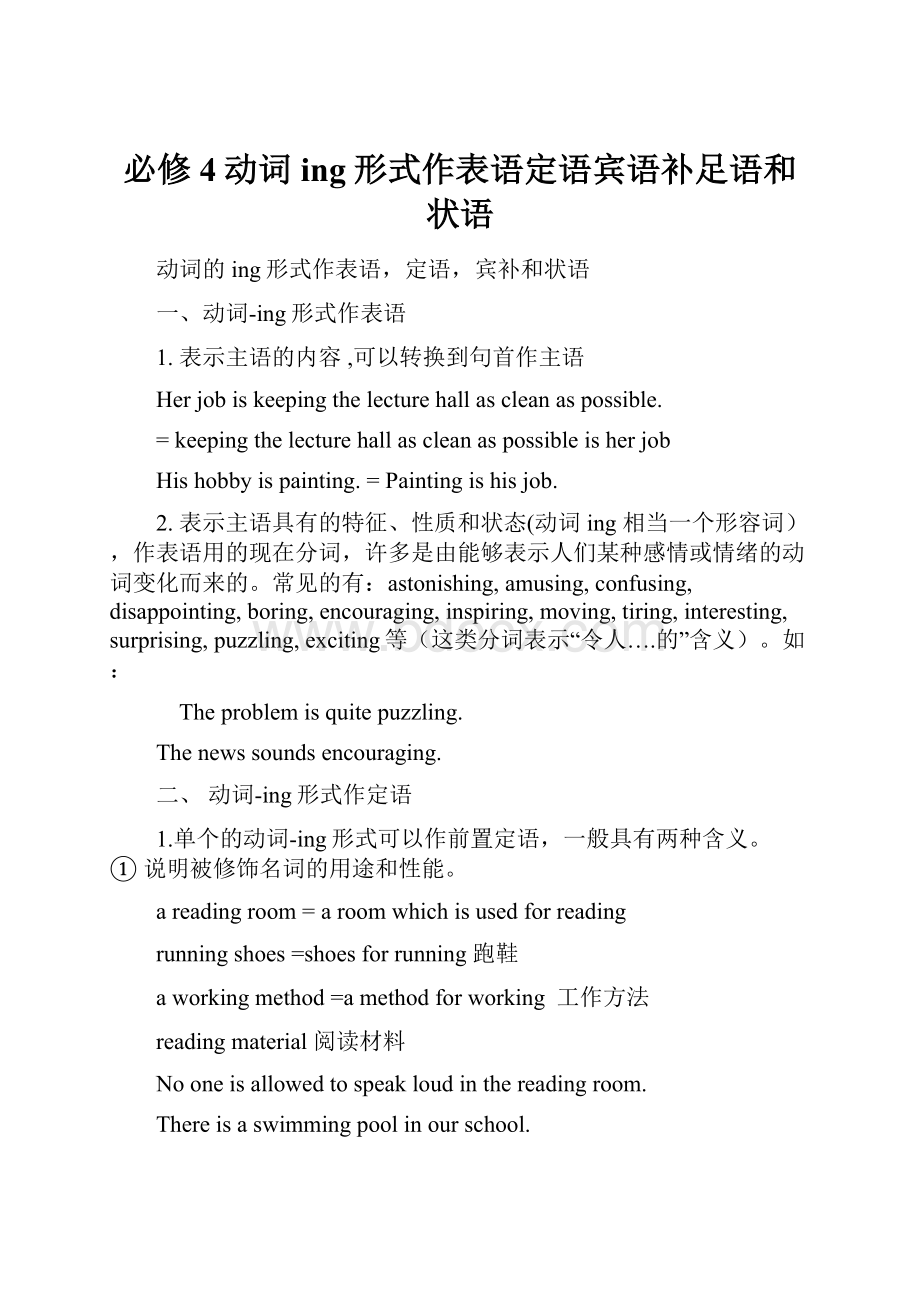必修4动词ing形式作表语定语宾语补足语和状语.docx
《必修4动词ing形式作表语定语宾语补足语和状语.docx》由会员分享,可在线阅读,更多相关《必修4动词ing形式作表语定语宾语补足语和状语.docx(13页珍藏版)》请在冰豆网上搜索。

必修4动词ing形式作表语定语宾语补足语和状语
动词的ing形式作表语,定语,宾补和状语
一、动词-ing形式作表语
1.表示主语的内容,可以转换到句首作主语
Herjobiskeepingthelecturehallascleanaspossible.
=keepingthelecturehallascleanaspossibleisherjob
Hishobbyispainting.=Paintingishisjob.
2.表示主语具有的特征、性质和状态(动词ing相当一个形容词),作表语用的现在分词,许多是由能够表示人们某种感情或情绪的动词变化而来的。
常见的有:
astonishing,amusing,confusing,disappointing,boring,encouraging,inspiring,moving,tiring,interesting,surprising,puzzling,exciting等(这类分词表示“令人….的”含义)。
如:
Theproblemisquitepuzzling.
Thenewssoundsencouraging.
二、动词-ing形式作定语
1.单个的动词-ing形式可以作前置定语,一般具有两种含义。
①说明被修饰名词的用途和性能。
areadingroom =aroomwhichisusedforreading
runningshoes=shoesforrunning跑鞋
aworkingmethod =amethodforworking 工作方法
readingmaterial阅读材料
Nooneisallowedtospeakloudinthereadingroom.
Thereisaswimmingpoolinourschool.
②表示所修饰的人或物的动作或状态,在意思上接近一个定语从句,可以表示正在进行的动作,也可表示经常性动作或当时的状态。
(注意动名词作定语说明被修饰词作用意义;现在分词做定语说明被修饰词正在做什么)
developingcountries=countriesthataredeveloping发展中国家
anordinary-lookinghouse=ahousethatlooksordinary看起来很普通的房子
apuzzlingproblem=aproblemthatpuzzlessomebody困扰人的问题
sleepingchild熟睡的孩子walkingstick手杖
livingroom起居室runningwater自来水
2.作定语的动词-ing形式如是一个短语,则应放在被修饰词的后面,做后置定语,相当于一个定语从句。
Theylivedinahousefacingsouth.(=whichisfacingsouth)
他们住在一所朝南的房子里。
Doyouknowtheboyplayingbasket?
(=Whoisplayingbasket)
你认识在打篮球的那个小男孩吗?
ThemanvisitingJapan(=themanwhoisvisitingJapan)ismyuncle
正在访问日本的那个男人是我的叔叔。
Inthefollowingyearsheworkedevenhard.
在接下来的几年中,他工作更努力了。
Themantalkingto(=themanwhoistalkingto)theteacherisourmonitor’sfather.
正在与老师谈话的那个人是我们班长的父亲。
三、动词-ing形式作宾补
1、动词-ing形式作宾语补足语常放在宾语后面,表示一个正在进行的主动性的动作,强调一个过程或一种状态。
Whenwereturned,wefoundastrangerstandinginfrontofthehouse.
2、当主句转换为被动结构时,原来作宾语补足语的动词-ing形式便转换为主语补足语。
Theyfoundthefilmveryexciting.=Thefilmisfoundveryexciting.
3、能用-ing形式作宾语补足语的几类动词:
1)表示感觉和心理状态的感官动词,(常见的有see,hear,feel,smell,find,notice,observe,lookat,catch,listento等)+sb+doingsth(作宾补)
Ifeltsomebodystandingbehindme.
Icaughtastrangerslidingintothemanager’soffice.
2)表示指使意义的动词使役动词,(常见的有have,set,keep,get,leave等)+sb/sth+doingsth(作宾补)
Wekeptthefireburningallnightlong.我们让火整夜燃烧着。
Iwon‘thaveyourunningaboutintheroom.我不允许你在房间里跑来跑去。
Thissetsmethinking.
Youshouldn’tkeepyourlightsburningintheday.
4、see,hear,feel,watch等动词之后用-ing形式和动词不定式(省to)作宾语补足语的区别:
Weheardthetelephonering.
Weheardthetelephoneringing.
前者表示动作正在进行,后者表示(或强调)动作的全过程。
四、动词-ing形式作状语
动词-ing形式可以作状语,在句中表示时间、原因、结果、条件、让步、行为方式或伴随情况等,相当于相对应的状语从句。
动词-ing形式作时间、原因、条件、让步状语时多位于句首;作结果、伴随情况状语时常位于句末。
1表示时间,相当于一个时间状语从句。
(有时可在动词-ing前加一个表时间的连词,如when,while等)
Havingmadefullpreparations,wearereadyfortheexamination.
我们已经作好了充分准备,现在可以应考了。
(=Afterwehavemadefullpreparations...)
Hearingthenews,theyjumpedwithgreatjoy.
Havingfinishedhishomework,Henrywenthome.(=Afterhavingfinishedhishomework/Afterhehadfinishedhishomework,Hernywenthome.)
2表示原因,相当于一个原因状语从句。
Beingill,hedidn'tgotoschoolyesterday.
由于生病,他昨天没有上学。
(=Sincehewasill...)
Beingpoor,hecouldn’taffordaTVset.(=Ashewaspoor,hecouldn’taffordaTVset.)
Notknowinghisphonenumber,wecouldn’tgetintouchwithhim.(=Becausewedidn’tknowhisphonenumber,wecouldn’tgetintouchwithhim.)
3表示结果,相当于一个并列谓语。
Hisfatherdied,leavinghimalotofmoney.
=andlefthimalotofmoney.
他父亲死了,留给他许多钱.
Europeanfootballisplayedin80countries,makingisthemostpopularsportintheworld.(=Europeanfootballisplayedin80countries;asaresult,itbecomesthemostpopularsportintheworld.)
4表示条件,相当于一个条件状语从句。
Workinghardatyourlessons,youwillsucceed.
=Ifyouworkhardatyourlessons.
如果你努力学习,就一定能成功。
Usingyourhead,you’llfindagoodway.(=Ifyouuseyourhead,you’llfindagoodway.)
Drivingtoofast,you’lldamagethecar.(=Ifyoudrivetoofast,you’lldamagethecar)
5表示让步,相当于一个让步状语从句。
Althoughtoilingalltheyearround(=Althoughhewastoilingalltheyearround), thepoorpeasantcouldn'taffordtosendhischildrentoschool.
这位贫苦的农民,尽管终年劳累,还是无力送孩子上学。
Weighingalmostonehundredjin(=Thoughitweighedalmostonehundredjin), theboxwasliftedbyhimwithonehand.
6表示行为方式、伴随情况或补充说明,相当于一个并列结构。
Helayonthegrass,staringattheskyforalongtime.
=...andstaredattheskyforalongtime
他躺在草地上,长时间地望着天空。
Thesixblindmenstoodalldaylongbytheroadside, beggingformoney
(=theywerebeggingformoney).
这六个盲人整天站在路边乞讨。
Hewentout, slammingthe door(=heslammedthe door).
他走出去,砰地一声把门带上。
一、同义句转换(用动词-ing形式)
1.Thebuswasheldupbythesnowstorm,soitcausedthedelay.
Thebuswasheldupbythesnowstorm,________thedelay.
2.Johnwatchedcuriouslyandthoughtthatthewomanseemedalittlecrazy.
Johnwatchedcuriously,_______thatthewomanseemedalittlecrazy.
3.WhileIwaswaitingforthetrain,Ihadalongtalkwithhim.
_________forthetrain,Ihadalongtalkwithhim.
4.BecauseIwasill,Istayedathome.
_________,Istayedathome.
5.Ifyouturnrightatthesecondcrossing,youwillfindthepostoffice.
_________rightatthesecondcrossing,youwillfindthepostoffice.
6.Becauseshehadbeenbeatenbyasnake,shewasfrightenedatit.
____________________byasnake,shewasfrightenedatit.
二、选择填空
1.ThoughIhaveoftenheardthissong______,Ihaveneverheardyou______it.
A.beingsung;sangB.sang;singingC.sung;singD.tobesung;tosing
2.Itwassocoldthattheykeptthefire______allnight.
A.toburnB.burnC.burningD.burned
3.Helookedaroundandcaughtaman______hishandintothepocketofapassenger.
A.putB.tobeputtingC.toputD.putting
4.—Didyoumeetanyone______attheparty?
—No,infact,Ifoundthepartyrather______.
A.interesting;boringB.interested;boring
C.interesting;boredD.interested;bored
5.Thesalesmanscoldedthegirlcaught______andletheroff.
A.tohavestolenB.tobestealing
C.tostealD.stealing
6.Don’tleavethewater_______whileyoubrushyourteeth.
A.runB.runningC.beingrunD.torun
7.The_______boywaslastseen_______neartheEastLake.
A.missing;playingB.missing;playC.missed;playedD.missed;toplay
8.Acookwillbeimmediatelyfiredifheisfound_______inthekitchen.
A.smokeB.smokingC.tosmokeD.smoked
9.Hisjobis________allthechildren.
A.lookafterB.lookedafterC.lookingafterD.havinglookedafter
10.---Doyouknowthegirl______nearthewindow?
---Sheismydeskmate.
A.seatingB.standingC.issittingD.isstanding
11.Whatworriedtheboymostwas________tovisithisfatheristhehospital.
A.hisnotbeingallowedB.hisnotallowing
C.hisnotbeenallowedD.hisbeingnotallowed
12.IsitpossibleforaChineseschooltoacceptthepolicy_______theuseofmobilephonesoncampus?
A.permittingB.topermitC.permittedD.beingpermitted
13.---Wasyesterday’sconferencesuccessful?
---Notreally.Thenumberof________wasmuchsmallerthanwehadexpected.
A.peoplewhoattendB.peopleattendedC.peopleattendingD.peopleattend
14.________suchagoodchance,howcouldsheletitslip?
A.HavingbeengivenB.HavinggivenC.TobeinggivenD.Tohavegiven
15.Livingnearthesea,_________.
A.weenjoyfreshairandbeautifulsight.
B.freshairandbeautifuliswhatweenjoy
C.itisfreshandbeautifulsightiswhatweenjoy
D.soweenjoyfreshandbeautifulsight
16.ThinkingaboutthefactthatIwasnotwellprepared,and________tolosemyface,IgaveuptheEnglishcontest.
A.notwantingB.notwantC.notwantedD.nottowant
17.Therearemanymistakesinhisessay,______hisfailure.
A.whichresultsB.leadingtoC.ledtoD.thatledto
18.________suchheavyloss,thebusinessmandoesn’thavethecouragetogoon.
A.HavingsufferedB.SufferingC.TosufferD.Suffered
19._________theproject,theyhavetostaythereforanothertwoweeks.
A.NotcompletingB.Notcompleted
C.NothavingcompletedD.Havingnotcompleted
20.Though_______naturalresources,theareaiswelldeveloped.
A.lackedB.lackingofC.lackingD.lackedin
21.________,heseemstobeverynervous.
A.JudgefromappearanceB.Judgesfromappearance
C.JudgedfromappearanceD.Judgingfromappearan
动名词与现在分词用法的区别
动词的-ing形式按功能可分为动名词和现在分词。
首先,动词的-ing形式在起名词作用时,称为动名词;用作形容词或副词时,称为现在分词。
一、动词的-ing形式用作主语时为动名词,现在分词不可以用作主语。
1.动名词用作主语.
ReadingFrenchiseasierthanspeakingit.阅读法文比讲法语容易。
2.有时it作形式主语,把动名词主语放在句子后面
It’snousetalkingwithhim.在这里碰到你真是奇迹。
Itwasawasteoftimereadingthatbook.看那本书是浪费时间。
3.“Thereis+no”后可以用动名词作主语
Therewasnoknowingwhathecoulddo.他能做什么很难说。
Therewasnoarguingwithher.没法和她争论。
二、动词的-ing形式用作宾语时为动名词,现在分词不可以用作宾语。
1.有许多动词可接动名词作宾语
Isuggestedbringingthemeetingtoanend.我建议结束会议。
2.有许多带介词的动词固定搭配接动名词作宾语
Hehasgivenupplayingfootball.他现在不踢足球了。
三、当动词的-ing形式用作状语时为现在分词,动名词不可以用作状语。
现在分词及其短语可以用作状语,表示时间、原因、结果、条件、让步、方式或伴随情况等。
其动作可能发生在谓语之前或之后,也可能与谓语动词的动作同时发生。
Climbingtothetopofthetower,wesawamagnificentview.
我们爬到塔顶后,看到了一片壮丽的景象。
(表时间)
Livinginthecountry,wehadfewsocialengagements.
我们住在乡下,交际的机会很少。
(表原因)
Havingmoney,hewillbuyabiggercar.(表条件)
Knowingthesecret,shewouldnottellmeaboutit..(表让步)
Thechildfell,strikinghisheadagainstthedoorandcuttingit.
那孩子跌倒了,头碰在门上碰破了.(表结果)
Hestoodleaningagainstthewall.他靠墙站着.(表方式或伴随情况)
四、动名词与现在分词都可以用作表语,当动词的-ing的作用相当于名词时为动名词。
当动词的-ing的作用相当于形容词时,动词的-ing为现在分词。
1.动名词用作表语
Herhobbyispainting.她的爱好是绘画。
Herjobwastendingthesheep.她的工作是放羊。
Themainthingisgettingthereintime.首要的事是及时到达那里。
2.现在分词用作表语
Thenewsisencouraging.这消息令人鼓舞。
Thisstoryisveryinteresting.这个故事很有趣。
Thedaywassoch